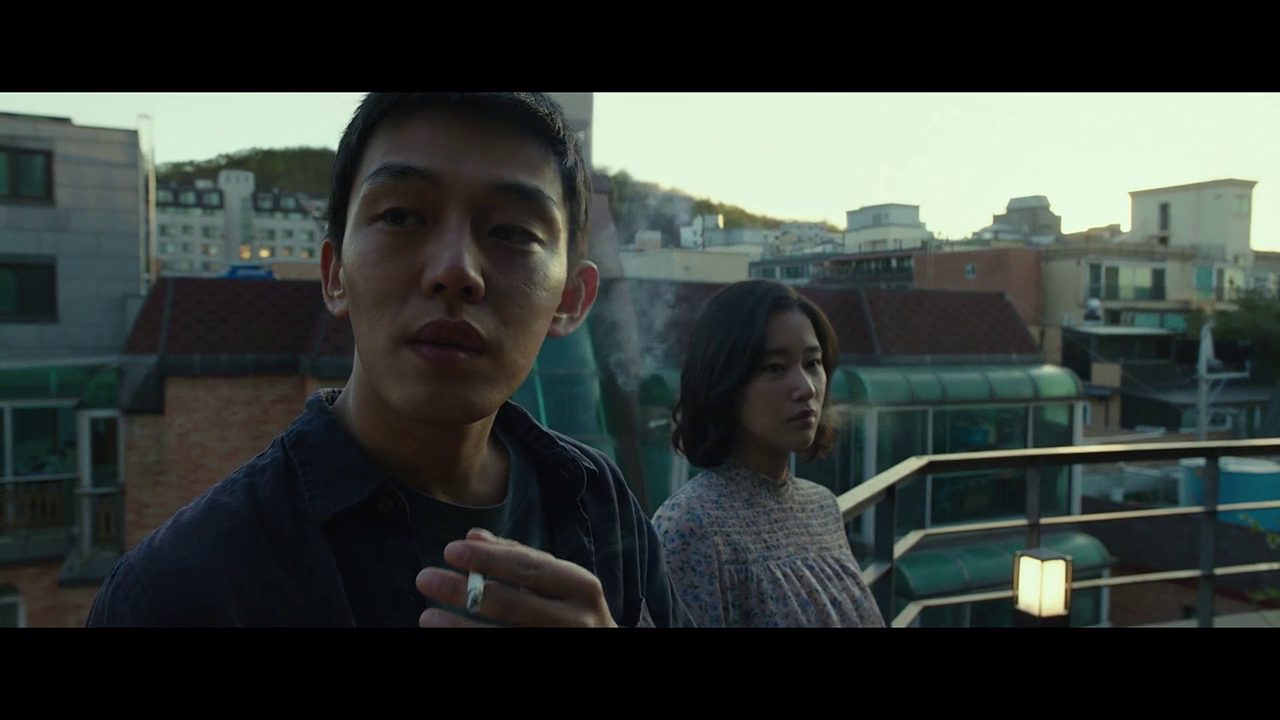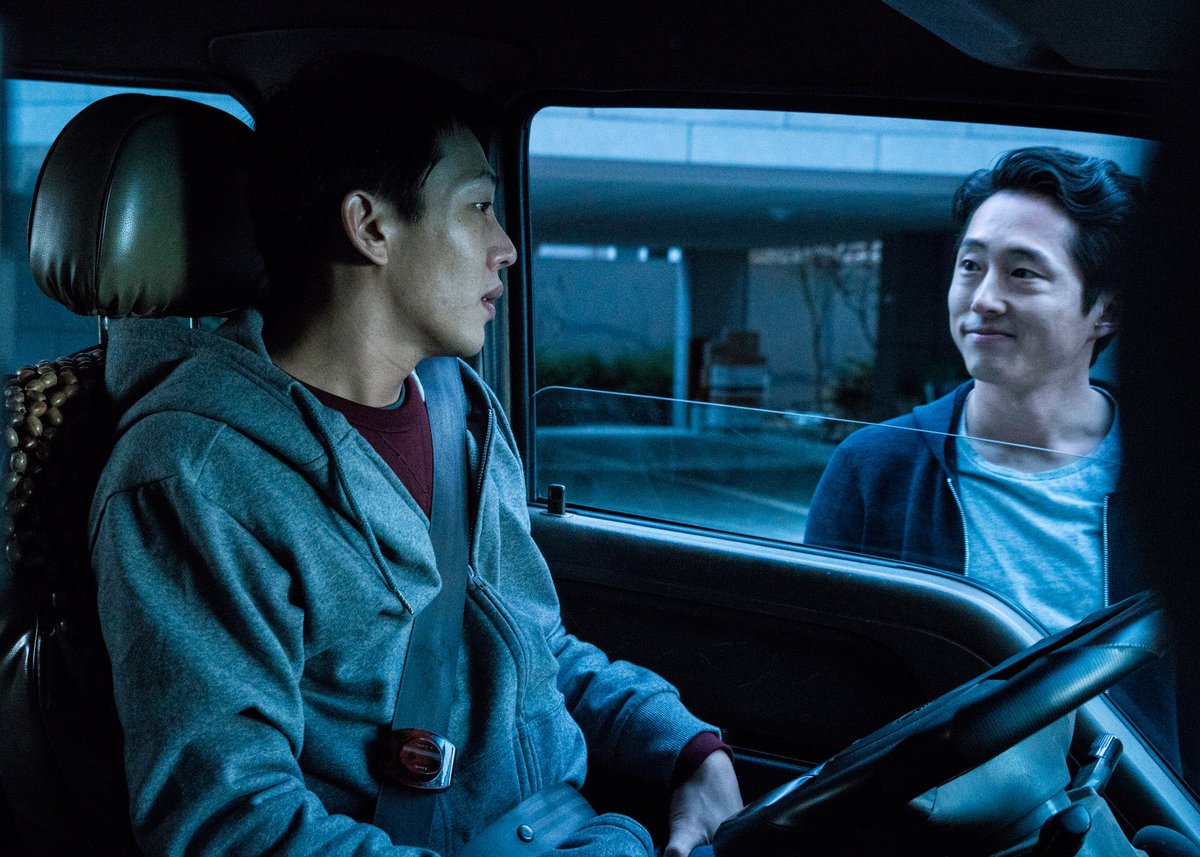“The world is a mystery to me,” the awkward, aspiring writer Lee Jong-su tells his new “Gatsby-like” acquaintance Ben, at a moment of a maximum queasiness in Chang-dong Lee‘s Burning. The film is a mystery to us, not just in its genre mechanics but in terms of how we are supposed to engage with it: Burning talks and moves like a mystery, lingering on images in ways we’ve been trained to recognize as meaningful, before trailing away like smoke.
Another character explains pantomime over drinks: the goal isn’t to pretend she’s eating a tangerine; you have to forget that she’s not. Burning is less a cinematic sleight of hand, in the mold of Haneke’s Caché, than an attempt to occupy negative space. It’s deeply unsettling, and one of the best films of the year.
 The narrative seems too slight to sustain Burning‘s 148 minutes. Jong-su (Ah-In Yoo) meets a childhood friend Hae-mi (Jong-seo Jeon) outside of a store he’s delivering goods to. (Class asserts itself early and often in Burning: he’s a part-time delivery driver, she dances in front of shops, calling out deals to entice customers and giving away raffled knick-knacks.) “Friend” is too strong a word; he barely remembers her, though they grew up together. They strike up a conversation, and then a casual relationship, and then she asks him to look after her cat while she travels to Kenya. It’s an odd request, but fitting with her sense of unmoored longing. They’re both dreamers.
The narrative seems too slight to sustain Burning‘s 148 minutes. Jong-su (Ah-In Yoo) meets a childhood friend Hae-mi (Jong-seo Jeon) outside of a store he’s delivering goods to. (Class asserts itself early and often in Burning: he’s a part-time delivery driver, she dances in front of shops, calling out deals to entice customers and giving away raffled knick-knacks.) “Friend” is too strong a word; he barely remembers her, though they grew up together. They strike up a conversation, and then a casual relationship, and then she asks him to look after her cat while she travels to Kenya. It’s an odd request, but fitting with her sense of unmoored longing. They’re both dreamers.
She returns from Africa with the bluntly-named Ben (a dashing, disconcerting Steven Yeun, having a big year), who immediately inserts himself between the two lovers. The others work, he “plays”. He drives a Porsche, lives in a well-appointed apartment above the city, and carries himself with an ease that either speaks to inherited wealth or sociopathic tendencies. (Assuming you make such distinctions.) He yawns at the entourages he assembles, as though he suffers others’ company for exactly as long as they prove entertaining and no longer; it’s not his only feline characteristic. Ben lights a joint on the porch of Jong-su’s father’s farm on the North Korean border, where speakers blare propaganda at no one in particular and Donald Trump prattles on about “America First” on a TV glimpsed in passing, and tells Jong-su that he burns down greenhouses as a hobby. Soon, Hae-mi vanishes without a trace.
 The rest of Burning trails Jong-su as he trails Ben. The question of Hae-mi’s fate hangs over everything, but the film keeps it at a remove. Clues materialize, along with doubt as to whether they are clues at all. Jong-su’s jealousy clouds the issue; so does Ben’s nonchalance. Burning balances ambiguities, dropping them into a carefully tenuated portrait of Korean millenial angst, and it becomes increasingly difficult to turn away from our own role in distinguishing what’s there from what’s not not there. Is Ben a Dickie Greenleaf or a Tom Ripley? Did Hae-mi fall in a well as a child? Why does she pointedly tell Jong-su that he’d called her ugly as a teenager, that it was the only thing he said to her in middle school? What is the role of the older generation — the women who refuse to see Hae-mi until she pays back her debts, the father on trial for assaulting a police officer? How does it fit together?
The rest of Burning trails Jong-su as he trails Ben. The question of Hae-mi’s fate hangs over everything, but the film keeps it at a remove. Clues materialize, along with doubt as to whether they are clues at all. Jong-su’s jealousy clouds the issue; so does Ben’s nonchalance. Burning balances ambiguities, dropping them into a carefully tenuated portrait of Korean millenial angst, and it becomes increasingly difficult to turn away from our own role in distinguishing what’s there from what’s not not there. Is Ben a Dickie Greenleaf or a Tom Ripley? Did Hae-mi fall in a well as a child? Why does she pointedly tell Jong-su that he’d called her ugly as a teenager, that it was the only thing he said to her in middle school? What is the role of the older generation — the women who refuse to see Hae-mi until she pays back her debts, the father on trial for assaulting a police officer? How does it fit together?
Chang-dong Lee steers clear of crescendo reveals, preferring an accumulation of resonance. References to Fitzgerald and Faulkner underscore Burning‘s sense of dislocation, and a crucial moment of sun-dappled freedom, interpreted so differently by each lover, is set to Miles Davis’ score for Elevator To The Gallows. We are nowhere, it’s now, options are dwindling, and, somewhere, something is about to be set on fire.

